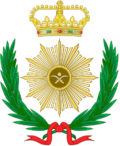Monarchy of Shorewell
| Sultan of Shorewell | |
|---|---|
Imperial | |
 | |
| Incumbent | |
 | |
| Bilal I | |
| Details | |
| Style | His Imperial Majesty |
| Heir presumptive | Crown Prince Humza |
| First monarch | Bilal I |
| Formation | 18 May 2016 |
The monarchy of Shorewell, commonly referred to as the Crown or constitutionally the Throne, is the political body comprising of the Monarch and the Imperial Family. The official title of the office of the Monarch holds the title of Sultan if male, and Sultana if female. The first and current Monarch of Shorewell is Bilal I.
Titles
Even though in actuality, the Sultan of Shorewell claims imperial status, he is commonly referred to as the monarch of the Shorewell in legal documents such as the constitution due to how the word monarch doesn't explicitly defy the status of imperial rank. In addition, the Sultan is officially the Sultan of Shorewell, albeit he may be referred to as the Sultan of the Shorewellese, Emperor of Shorewell, and Emperor of the Shorewellese, though only the former remains within conventional use.
The monarch holds various other titles besides Sultan, some of which include foreign knighthoods and titles.
Imperium
Imperium is considered the possession of the imperial rank of Emperors. The Shorewellese Imperium ideology holds elevated view of the Emperor, as it finds that all Emperors should be able to trace recognition of their imperial rank from the Roman Emperors. Shorewellese Foreign policy heavily revolves Imperium and the method of recognizing other Imperial ranks. Multiple treaties have been signed with nations that claim to have Emperors, however, provisions of Shorewell recognizing the said status have not been commonly instituted, thus not granting recognition of the imperial rank even if the signatories are addressed as emperor's for the sake of protocol. The Emperor styles himself as Sultan in legal documents, and is considered to be supreme in matters of the monarchy and government.
Executive powers and roles as Head of State
The Head of State is the ruling monarch, who is currently Bilal I. As the Head of State, the monarch practices full control over all other bodies of the government. The Head of State alone can pass laws, sign treaties, as well as carry out any other function of government that falls within his prerogative. Every project, institution, proposal, and idea must be approved by the head of state in order to be enacted or otherwise carried out.
Domestic Powers
- The power to dismiss and appoint a Grand Vizier
- The power to dismiss and appoint other ministers
- The power to summon, prorogue and dissolve General Assembly
- The power to grant or refuse Imperial Assent to bills (making them valid and law)
- The power to commission officers in the Armed Forces
- The power to command the Armed Forces of the Shorewellese Empire
- The power to appoint members to the Sultan's Counsel
- The power to issue and withdraw passports
- The power to grant Prerogative of mercy
- The power to grant honors
Foreign Powers
- The power to ratify and make treaties
- The power to declare War and Peace
- The power to deploy the Armed Forces overseas
- The power to recognize states
- The power to credit and receive diplomats